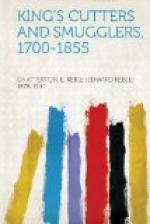It is conscience that makes cowards of us all, and this may be said of smugglers no less than of law-abiding citizens. A trial was going on in connection with a certain incident which had occurred in Cawsand Bay, Plymouth Sound. It was alleged that, on the night of November 17, 1831, a man named Phillips had been shot in the knee whilst in a boat, trying with the aid of some other men to get up an anchor. The chief officer of the Preventive service at Cawsand was accused by Phillips of having thus injured him, and the case in the course of time was brought into court. Among the witnesses was one whom counsel believed to be not wholly unconnected with smuggling. Whether or not this was true we need not worry ourselves, but the following questions and answers are well worth recording.
Cawsand was a notorious smuggling locality, and its secluded bay, with plenty of deep water almost up to the beach, made it highly suitable for sinking tubs well below the surface of the water. And then there must have been very few people ashore who had never been concerned in this contraband trade. In such villages as this you might usually rely on the local innkeeper knowing as much as anyone in the neighbourhood on the subject of smuggling. Such a man, then, from Cawsand, illiterate, but wideawake, went into the witness-box for counsel to cross-examine, and the following dialogue carries its own conviction:—
Question. “You are an innkeeper and sailor, if I understand you rightly?”
Answer. “Yes!”
Q. “Is that all?”
A. “Mariner and innkeeper.”
Q. “Is that all the trades you follow?”
A. “Fishing sometimes.”
Q. “What do you fish for?”
A. “Different sorts of fish.”
Q. “Did you ever fish for half-ankers?”
A. “Half-ankers?”
Q. “Casks of spirits—is that part of your fishing-tackle?”
A. “No, I was never convicted of no such thing.”
Q. “I am not asking you that. You know what I mean. I ask whether it is part of your profession.”
A. “No, it was not.”
Q. “You never do such things?”
A. “What should I do it for?”
Q. “I cannot tell you. I ask you whether you do it, not what you do it for.”
A. “I may choose to resolve whether I tell you or not.”
Q. “I will not press you if your conscience is tender. You will not tell me whether you do a little stroke in the Fair trade upon the coast? You will not answer me that question?”
A. “I am telling the truth.”
Q. “Will you answer that question?”
A. “No.”
Q. “Are you or are you not frequently in practice as a smuggler?”
A. “No!”
And that was all that could be got out of a man who probably could have told some of the best smuggling yarns in Cornwall. The inhabitants so thoroughly loathed the Preventive men that, to quote the words of the man who was chief officer there at the time we are speaking of, “the hatred of the Cawsand smugglers is ... so great that they scarcely ever omit an opportunity of showing it either by insult or otherwise.”




